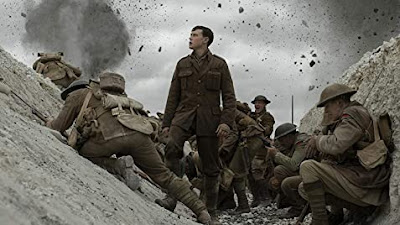The opening shot begins with a view of a green field lush with wildflowers, slowly pulling back to reveal two weary British soldiers resting, one lying on his back, helmet over his eyes, and the other leaning against a tree. A third soldier enters the frame--we only see his legs--gently kicks the first soldier to wake him, and says, "Blake. Pick a man. Bring your kit."
The two soldiers stand up and begin walking. The camera doesn't blink as they proceed to walk through a camp where other soldiers are busy with various activities, and then proceed into the trenches, the camera eye still open, a single long shot from the first, first leading them and then following them. They arrive at an underground bunker to report to the general -- who would rarely come in person to this position so near to the front. "It must be something important."
As it turns out, it is very important. The Germans have withdrawn from their lines and appear to be on the run, but British reconnaissance has revealed that they've set up a trap, dug in new entrenchments 9 miles back. There is a British wing that intends to pursue the retreating Germans without knowing they will be massacred. And there is no way to communicate with them because their communication lines have been cut by the enemy. Blake's brother is one of those 1600 men who will be wiped out should the next day's attack be undertaken.
Your job, boys, is to bring this memo to the commanding officer Major Stevens, to stop the invasion before it begins. "You think you can get there in time?"
The camera has yet to break. They leave the command center and return to the crowded trench, making haste to get on with the mission, Blake driven by a need to save his brother. You can see Blake's agitation as he pushes through the trench, increasingly disturbed.
Ten minutes in and this whole intro is clearly a tribute to previous masters of film. The long opening shot from Orson Welles' Touch of Evil comes to mind, given a nod again in The Player. And it's impossible not to be reminded of Kirk Douglas walking through the trenches in Kubrick's Paths of Glory.
The soundtrack's ebb and flow is fairly tense throughout. The scenery is an epic re-creation of what it must have been like in that horrorshow of a war. As the two young men begin their journey, everything they see and experience is undoubtedly the way it was, a stomach-wrenching scene of death and decay.
The film won three academy awards. It's easy to see why. In a hundred ways the film shows us how awful war can be, but also what heroism is. The latter is why the film garnered such praise.
What is heroism? It begins with a clear sense of purpose, and a commitment to do whatever it takes to attain that objective.
Unlike the objective in Paths of Glory, capturing an ant hill, the hero here is risking everything to save the lives of 1600 fellow soldiers. The manifold obstacles between him and his goal are what drive the story.
Lance Corporal Blake is played by Dean-Charles Chapman, his companion Lance Corporal Schofield played by George MacKay.
There are so many features that make this a great film. The directing, cinematography, acting, soundtrack, the storyline and the emotions it invokes all contribute. The simple, subtle manner in which you find yourself drawn into the story is utterly brilliant, a sleight of hand maneuver that effectively weds you to these two young men who must carry out an impossible mission.
In short, the film is an achievement of the first order, and as grisly and gritty as it was, it leaves you rewarded for having invested the time to see it. 10 stars out of 10.












No comments:
Post a Comment